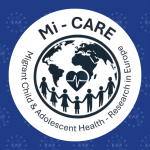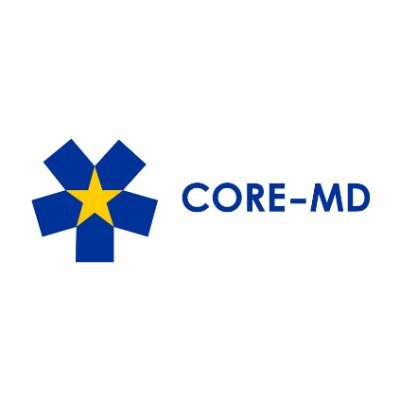REACH Project: Paediatric Migrant Health in Europe
December 18, 2024
The Second Mi-CARE Survey has launched!
A Europe-wide study on pediatric migrant health
Our goal is to better understand and improve healthcare services for migrant children across Europe via research, and we need your support!
- Survey Period: open until May 20, 2025
- Participation: Online (link below) or via paper questionnaire
- Target Group: Parents, caregivers, and healthcare professionals of migrant children
Your participation is anonymous and takes just 5–15 minutes. Every voice matters in helping us shape better healthcare services for the future. Please share the survey with your network—friends, colleagues, and any organizations or institutions you know might be interested. We’re happy to provide flyers, QR codes, or printed survey copies in different languages if needed.
Survey Link: https://www.research.net/r/Mi-CARE
Learn more about MiCare and Reach with the introductory video below (or continue reading).
Playlist
What is the Mi-CARE project about?
Children, adolescents, and families with migration experiences face unique and often daunting challenges when navigating the healthcare systems in Europe. From specific healthcare needs resulting from their migration journey, to language barriers and unfamiliar healthcare processes, they are often at a disadvantage when it comes to receiving the care they need. Research addressing these challenges is essential to ensure that every child, regardless of their background, receives the best possible healthcare.
The MIgrant Child & Adolescent health – Research in Europe Priority Setting Partnership (Mi-CARE PSP) is conducted in cooperation with the James Lind Alliance (JLA – https://www.jla.nihr.ac.uk/), a non-profit making initiative that brings together patients, carers and clinicians in JLA Priority Setting Partnerships (PSPs). JLA PSPs identify and prioritize unanswered questions in a specific area that they agree are the most important, so that researchers and funders are aware of the issues that matter most to the people.
What do we do?
Following the JLA methodology, the Mi-CARE project has several steps:
✅ Step 1 – Gathering unanswered questions [COMPLETED Oct-Dec 2024]:
A Europe-wide online survey is used to collect unanswered questions from people with lived experience of migration, caregivers, and healthcare professionals. We use multilingual resources, including videos and illustrations, to reduce language barriers and ensure broad participation. Collaborations with migrant-led organizations and personal connections between healthcare professionals, social workers, and patients help us reach migrant families, including those in vulnerable positions.
✅ Refining and summarizing questions [COMPLETED Jan-March 2025]:
The survey respondents are not researchers, so we do not expect their responses to be presented as clear research questions. We expect they will respond with concerns, ideas, as well as questions. Similar or duplicate questions will be grouped together to form researchable summary questions. Out-of-scope or already answered submissions will be compiled separately. The summary questions will then be checked to see if they have already been answered by existing research.
❗Step 2 – Prioritising researchable questions [In this step, we currently need your help!]
In this stage, the remaining summary questions about pediatric migrant health in Europe are prioritized through a consensus process, which involves two steps:
Shortlisting
A second Europe-wide survey among people with lived experience, caregivers, and professionals will ask people to select their top priorities. The results of this shortlisting will be used to identify the most important priorities (around 20-25 questions) to be taken to a final priority setting consensus workshop.
20 March - 20 May 2025
Final prioritization
A one-day workshop facilitated by the JLA will bring together about 30 participants (people with lived experience, caregivers, and healthcare professionals) to rank and determine the top 10 priorities.
June 2025 onwards
How can you support us?
We are actively seeking individuals, organizations, and groups to support and promote the Mi-CARE project. Here is how you can help:
1) Share your experiences and participate in the first Mi-CARE survey if you…
● migrated to Europe as a child or teenager
● are a parent or carer who migrated with children or had children after arriving
● are a healthcare professional (doctor, nurse, social worker, psychologist, etc.) working with migrant children and teenagers
2) Spread the word: Share the survey with others in your networks or show the introduction video to a migrant parent / caregiver and help them complete the survey.
We want to include a diversity of perspectives regarding the following aspects:
- Levels of care: e.g. arrival centre, consultancy for general population (primary care), hospital (secondary, tertiary care)
- Regions of healthcare delivery: e.g. Eastern Europe; arrival countries (such as Italy, Greece)
- Medical fields within pediatrics: e.g. mental health, emergency care, management of chronic diseases
- Paediatric age groups: e.g. babies, toddlers, children, adolescents
- Regions of patients’ childhood: e.g. Syria, Ukraine, different African and European countries
- Sociodemographic privilege of patients in host country: e.g. “highly skilled” working migrants, forced vs. voluntary migration
- Vulnerabilities of patients: e.g. marginalised sexual orientation and gender identities
Replies from those hardest to reach are most precious to the project.
3) Become an official partner organization: We welcome organizations that can reach and advocate for these groups to join the Mi-CARE project. In recognition of the collaboration, we would be happy to feature your logo on our webpage and within the online survey. Please reach out to us if you’d like to get involved!
What will happen with the project results?
agree their Top 10 list of the most important unanswered research questions in the field of pediatric migrant health in Europe. These priorities will serve as the foundation for future (research) collaboration projects aimed at improving healthcare for all children and adolescents in Europe, regardless of their background. The project results will be shared in various formats, including academic papers, lay reports, infographics, conference presentations, and social media videos. We will actively engage researchers, funder, and patient and clinical communities.
Let us know if you want to be involved or can connect us with relevant organizations!
MiCare Resources
Help Us Spread the Word
Please also download and print our flyers!
It would be amazing if you could spread them in places like hospitals, community centres, asylum centres, schools, libraries, or anywhere you think it could reach families and children who may have valuable insights to share with us through our survey.
Currently, flyers are available in English, German, French, Italian, Ukrainian, Arabic, Turkish and Polish. If you need flyers in other languages, feel free to reach out to us at micare.psp@gmail.com. You can download the flyers using the link below.
Who is responsible for the project?
The Mi-CARE Priority Setting Partnership is coordinated and overseen by the Mi-CARE Steering Group: a group of 14 international healthcare professionals and people with lived experience of migration from diverse backgrounds and countries. The Steering Group is supported by a JLA advisor and an information specialist. More information about the Steering Group members can be found here.
Mi-CARE is a project of the Refugees and Migrants in Europe – Adolescent and Child Health (REACH) network, a Special Advisory Group of the European Academy of Pediatrics (EAP), composed of healthcare professionals actively involved in pediatric migrant healthcare in various countries of the European Region.
Mi-CARE is carried out in collaboration with the James Lind Alliance, overseen by the National Institute for Health and Care Research, based at the NIHR Coordinating Centre (NIHRCC) at the University of Southampton.
For more information, please contact us at: micare.psp@gmail.com or visit our website.



